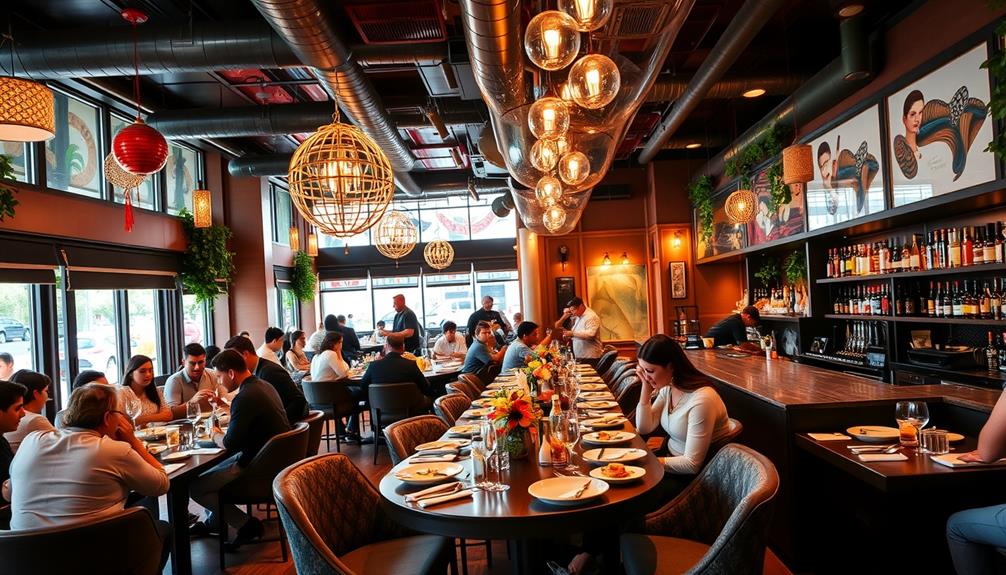To thrive as a restaurant owner, you can immerse yourself in some essential reads. "The Restaurant Manager's Handbook" by Douglas R. Brown offers invaluable operational insights. For financial skills, check out "Restaurant Success by the Numbers" by Roger Fields. If you're focused on customer relationships, Danny Meyer's "Setting the Table" emphasizes the importance of staff well-being. For practical day-to-day operations, "How to Rock Restaurant Management" by Katelyn Silva is a must. Each of these books offers unique advice and strategies to help you navigate your restaurant journey effectively. There's so much more to explore that can further boost your success.
Key Takeaways
- "The Restaurant Manager's Handbook" offers comprehensive guidance on operational processes, enhancing efficiency from setup to daily operations.
- "Restaurant Success by the Numbers" equips owners with essential budgeting tools and key financial metrics for better decision-making.
- "Setting the Table" emphasizes the importance of staff well-being and customer satisfaction through the concept of "Enlightened Hospitality."
- "How to Rock Restaurant Management" focuses on effective leadership techniques to improve team cohesion and streamline restaurant operations.
- "Kitchen Confidential" provides raw insights into industry challenges, helping owners prepare for the realities of running a restaurant.
Essential Management Books

When it comes to running a restaurant, what resources can truly make a difference in your management skills? Essential management books can guide you through the complexities of restaurant ownership, providing insights that can help you foster a positive workplace culture and increase customer satisfaction.
Start with "The Restaurant Manager's Handbook" by Douglas R. Brown, a definitive guide that covers everything from setup to operational processes, offering practical strategies to boost sales.
Next, enhance your financial literacy with "Restaurant Success by the Numbers" by Roger Fields. This book provides you with tools for budgeting and understanding key financial metrics, which are crucial for profitability.
To foster a positive culture, read "Setting the Table" by Danny Meyer. His concept of "Enlightened Hospitality" emphasizes the importance of creating an environment that promotes both staff and customer satisfaction, echoing the value of heartfelt expressions of love.
Katelyn Silva's "How to Rock Restaurant Management" dives into effective leadership techniques essential for building a cohesive team.
Finally, "The New Restaurant Survival Manual" by John D. McCarthy offers practical strategies for overcoming common challenges while focusing on operational efficiency.
Financial Planning Resources

When it comes to running a successful restaurant, mastering budgeting and forecasting techniques is key to your financial health.
Understanding fundamental financial concepts like credit scores and interest rates can greatly impact your decision-making process.
You'll need to implement effective profitability assessment strategies to guarantee your business stays on track and adapts to changing market conditions.
Let's explore some essential resources that can guide you in these critical areas.
Budgeting and Forecasting Techniques
Effective budgeting and forecasting are essential for restaurant owners looking to maintain financial health and drive profitability. By analyzing historical sales data and projecting future revenues based on seasonal trends, you can create an accurate financial forecast. This not only aids in budgeting but also supports effective restaurant management.
Additionally, understanding financial considerations for elderly care can provide valuable insights into managing costs and planning for future expenses.
- Imagine reducing waste and maximizing profit margins.
- Picture making informed decisions without stress.
- Envision your restaurant thriving in a competitive market.
- Feel the relief of financial stability.
Utilizing a pro forma profit-and-loss statement allows you to anticipate expenses and revenues, making financial planning smoother.
Regularly reviewing and adjusting your budget according to actual performance metrics—such as food and labor costs—will help you identify discrepancies and enhance your financial health.
Implementing inventory costing methods, like FIFO (First In, First Out), is vital for tracking food costs and managing waste effectively.
Finally, conducting financial feasibility studies before opening or expanding your restaurant can help you assess potential success based on market conditions and financial projections.
Profitability Assessment Strategies
Evaluating profitability is essential for restaurant owners aiming to sustain growth and adapt to market changes. To begin, conducting financial feasibility studies can help you assess the viability of your restaurant concept by analyzing projected revenues against estimated start-up and operational costs. This foundational step informs your profitability assessment.
Next, utilizing pro forma profit-and-loss statements allows you to evaluate expected profitability by forecasting income and expenses over a specified period. This method outlines your financial landscape and helps you make informed decisions.
Implementing sample sales forecasts aids in tracking and predicting sales trends, enabling you to adjust staffing and inventory management as needed.
Regularly reviewing operating budgets is critical for identifying discrepancies between projected and actual financial performance, allowing you to make timely adjustments to your strategies.
Additionally, understanding inventory costing is essential, as it directly impacts profit margins. By focusing on better purchasing and waste management practices, you can uncover areas for cost-saving measures.
Together, these strategies form a thorough approach to profitability assessment, ensuring you're well-equipped to steer your restaurant toward sustained success.
Customer Service Excellence

To achieve customer service excellence, you need to focus on building strong relationships with your guests and training your staff effectively.
When your team feels empowered and knowledgeable, they can create memorable experiences that keep customers coming back.
Let's explore how these elements can transform your restaurant's service quality and boost your bottom line.
Building Strong Relationships
Building strong relationships with your customers is essential for creating a loyal clientele. When you focus on customer service and personalized service, you're not just enhancing their dining experience; you're also building a foundation for loyalty that will keep them coming back.
Studies show that 70% of buying experiences hinge on how customers feel treated, so make every interaction count.
Here are some key strategies to strengthen those relationships:
- Listen actively to customer feedback and act on it.
- Personalize your service by remembering customers' preferences.
- Engage with your community through events and partnerships.
- Train your staff on effective communication and conflict resolution.
Training for Service Excellence
Training your staff for service excellence is essential in today's competitive restaurant landscape. Effective training programs focus on enhancing communication skills, leading to a 25% increase in customer satisfaction ratings.
By investing in thorough training, you can also experience a remarkable 40% reduction in employee turnover, which contributes to consistent service quality.
Implementing role-playing scenarios during training helps your staff develop vital problem-solving skills. This approach results in a 30% improvement in handling customer complaints effectively.
Regular training refreshers on service standards can further boost repeat business by up to 20%, as customers are more likely to return when they receive exceptional service.
Moreover, research shows that every dollar spent on customer service training can yield a return of $5.00, making it a wise investment for enhancing overall restaurant performance.
Prioritizing service excellence not only elevates customer satisfaction but also fosters loyalty, ensuring your restaurant thrives even in competitive markets.
Operational Efficiency Guides

Streamlining your restaurant's operations can greatly boost efficiency and profitability. To achieve this, consider diving into several insightful guides that focus on operational processes essential for restaurant management. These resources will help you develop your leadership skills while enhancing overall restaurant performance.
- Imagine serving customers with speed and precision.
- Picture your team working seamlessly, reducing stress.
- Envision a thriving restaurant, where profits soar.
- Feel the satisfaction of delivering exceptional service quality.
Books like The Restaurant Managers Handbook by Douglas R. Brown provide a thorough overview of operational processes important for efficiency.
How to Rock Restaurant Management by Katelyn Silva offers expert insights on streamlining operations, while Delivering The Digital Restaurant by Meredith Sandland & Carl Orsbourn highlights the role of technology in enhancing service speed and customer experience.
Don't forget about the financial side—Financial Management in Restaurants emphasizes budgeting, inventory management, and cost control strategies essential for maintaining operational efficiency.
Finally, The Complete Idiot's Guide to Starting a Restaurant by Howard Cannon stresses establishing standard operating procedures (SOPs) to guarantee consistency and enhance service quality.
Embrace these guides to maximize your restaurant's potential!
Insights From Industry Leaders

In the world of restaurant ownership, learning from those who've already navigated the challenges can be invaluable. The best restaurant management books offer insights directly from successful restaurateurs, giving you practical management tips that can shape your journey. These books often contain the best quotes from restaurants, capturing the wisdom and experience of industry leaders. From how to handle difficult customers to streamlining kitchen operations, the best management books provide actionable advice that can help you avoid common pitfalls and achieve success in the competitive world of restaurant ownership. By studying the advice and strategies of successful restaurateurs, you can gain a deeper understanding of the industry and develop the skills needed to thrive in this challenging but rewarding field. In addition to practical management tips, the best restaurant management books also often include quotes about dining experiences, offering a glimpse into the customer’s perspective. Understanding what makes a memorable dining experience can help you create a unique and unforgettable atmosphere in your own restaurant. By incorporating the wisdom and insights from these books into your own business practices, you can set yourself apart in the competitive restaurant industry and build a loyal customer base. Another valuable resource for restaurant owners is the use of restaurant management apps. These apps can help streamline processes, manage inventory, and track customer feedback, making the day-to-day operations of running a restaurant more efficient. By combining the insights gained from management books with the practical tools offered by these apps, restaurant owners can more effectively navigate the challenges of the industry and create a successful and thriving business.
"Setting the Table" by Danny Meyer introduces the concept of "Enlightened Hospitality," demonstrating how prioritizing your staff's well-being translates to enhanced customer satisfaction.
Similarly, "Restaurant Owners Uncorked" by Will Brawley presents interviews with over twenty restaurateurs, emphasizing the importance of community engagement in building a loyal customer base.
Chris Hill's "Making the Cut" highlights networking and continuous self-improvement as key traits of successful restaurateurs.
Meanwhile, Anthony Bourdain's "Kitchen Confidential" provides a raw look at the challenges and realities of the restaurant industry, preparing you for what lies ahead.
Innovative Trends and Strategies

Restaurants increasingly adopt innovative trends and strategies to stay competitive in a rapidly evolving market. To run a successful restaurant, you must embrace these changes and focus on enhancing customer satisfaction while improving operational efficiency.
- Sourcing local ingredients to create a sustainable menu
- Integrating technology for seamless mobile ordering
- Offering diverse plant-based options to cater to health-conscious diners
- Utilizing data analytics for smarter menu pricing
Fast casual dining is reshaping consumer preferences, so adapting your restaurant management approach is essential.
Sustainable practices not only attract environmentally conscious customers but also strengthen your brand identity. Technology integration, such as digital payment systems, enhances the dining experience and increases efficiency.
Moreover, the rising popularity of plant-based menus reflects a shift in consumer health and ethical considerations, making it important to include these options.
Finally, leveraging data analytics can help you make informed decisions about menu pricing and inventory management, ultimately driving profitability.
Networking and Learning Resources

Building a strong network is essential for any restaurant owner looking to thrive in a competitive landscape. Leveraging networking opportunities can open doors to collaborations, referrals, and insights into best practices.
Attend industry events, conferences, and workshops to connect with experts and gain knowledge about emerging restaurant trends. These gatherings are perfect for learning from the successes and challenges faced by your peers.
Consider engaging in mentorship programs, where experienced professionals provide personalized guidance to help you navigate obstacles and enhance your business acumen.
Joining professional associations and online communities related to the restaurant industry fosters a sense of belonging and grants access to tailored resources, research, and networking opportunities.
Don't overlook subscription services that offer ongoing education and expert insights. These educational resources keep you informed about market changes and operational strategies that can greatly impact your business.
Frequently Asked Questions
What Is the Best Ownership for a Restaurant?
The best ownership structure for your restaurant depends on your goals. If you value liability protection and flexible taxes, consider an LLC. For simplicity, a sole proprietorship might work, but it comes with personal risk.
How Do I Become a Successful Restaurant Owner?
To thrive as a restaurant owner, start with strategic planning, sharpen your skills, and seek support. Staying savvy about finances, focusing on fantastic service, and fostering connections will fuel your success in this competitive culinary landscape.
What's the Hardest Part of Owning a Restaurant?
The hardest part of owning a restaurant is managing cash flow. You'll face fierce competition, high staffing turnover, and the challenge of balancing quality service with operational efficiency—all while maneuvering through ever-changing regulations.
Which Course Is Best for Restaurant Owner?
To become a successful restaurant owner, you should consider courses in restaurant management, financial planning, and customer service. Hands-on training and specialized programs in culinary arts can also enhance your skills and knowledge considerably.
Conclusion
In the delightful journey of restaurant ownership, arming yourself with the right knowledge can turn challenges into opportunities. By exploring essential management books, financial planning resources, and customer service excellence guides, you'll uncover a treasure trove of insights. Embrace innovative trends and connect with industry leaders, and watch your restaurant thrive. Remember, every page you turn is a stepping stone toward culinary success. So, immerse yourself in these invaluable resources and savor the rewards that await! Additionally, investing in efficient restaurant management tools can streamline operations and improve overall productivity. From inventory management software to scheduling systems, these tools can help you stay organized and focused on delivering exceptional dining experiences. By integrating these tools into your business, you can elevate your restaurant to new heights of excellence. So, embrace these resources and technologies, and watch your restaurant soar.









